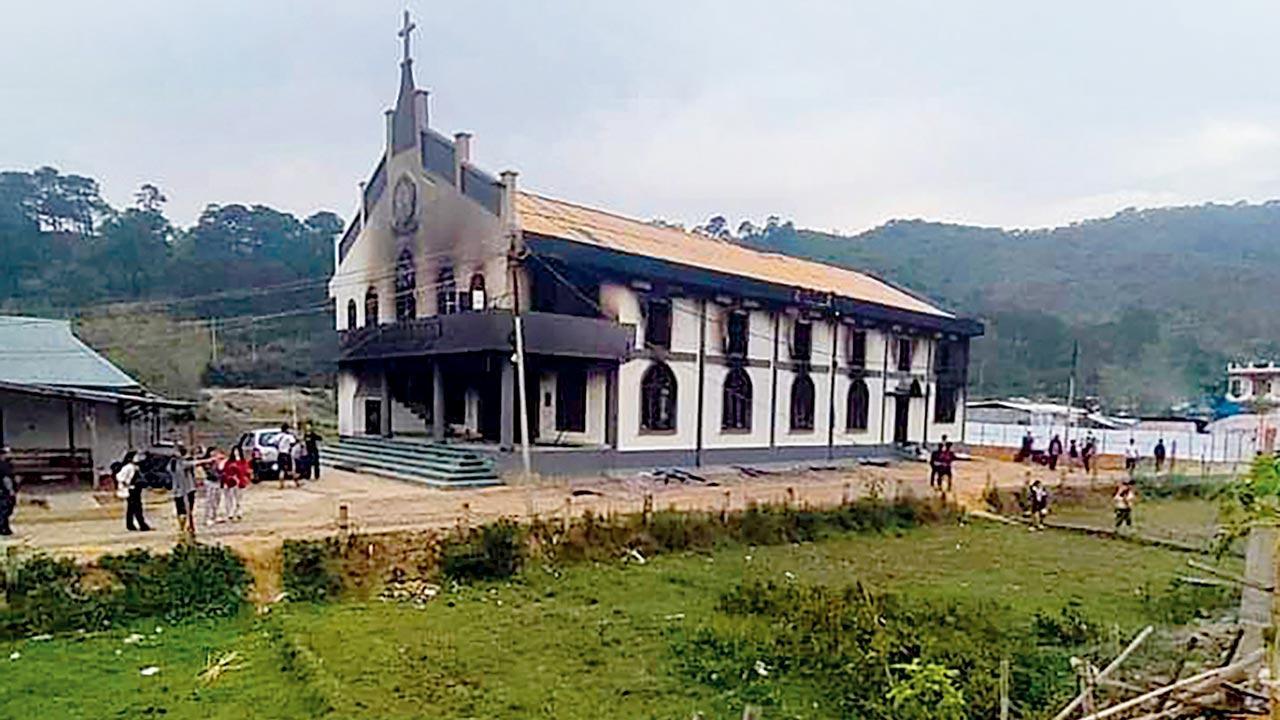Interestingly, the Imphal valley makes up for about a tenth of the total land mass of the state while the surrounding hills account for 90 per cent

Smoke billows out a building, in Imphal, on Thursday. Pic/PTI
Violence was brewing for some time as a long history of mutual suspicion between ethnic groups in the Imphal valley and its surrounding hills turned into a simmering conflict after the BJP-led Manipur government started a drive to evict tribal villagers from reserved forests.
The spark for the raging violence was lit by demonstrations by tribal groups against a move to grant the majority Meiteis the Scheduled Tribe (ST) status, being availed by the tribals living in the hills since Independence.
The government in Manipur, regardless of the party, has always been dominated by Meiteis, who account for about 53 per cent of the state’s population and live mostly in Imphal Valley. Consequently, the government’s actions have often been viewed through the prism of suspicion by tribals—mostly Nagas and Kukis—who make up 40 per cent of Manipur’s population and live in the hills.
Interestingly, the Imphal valley makes up for about a tenth of the total land mass of the state while the surrounding hills account for 90 per cent.
The eviction drive, which began in February, was seen as yet another anti-tribal move, leading to alarm and widespread discontent.
General secretary of the Kuki Students Organisation, Churachandpur, D J Haokip, told PTI, “Several areas in the hill district have been declared as reserved forests, protected forests and hundreds of Kuki tribals have been dislodged from their traditional settlement area.” “The anguish of the Kuki people is not about the evictions but the failure to provide rehabilitation to more than hundreds of those affected,” Haokip added.
Even as discontent grew over the eviction of the villagers, three churches in Imphal’s Tribal colony area were demolished on April 11 for being “illegal constructions” on government land, leading to more discontent.
“The ST communities of Manipur have been consistently opposing to the inclusion of fearing the loss of job opportunities and other affirmative actions granted to STs by the Constitution of India to a much advanced community like the Meitei,” the Indian Express (IE) quoted Janghaolun Haokip of the Kuki Inpi Manipur as saying.
“The claim that Meiteis need ST status to protect their culture and identity is self-defeating. The Meiteis are a dominant group controlling the state and its apparatuses. The state has been protecting their cultural, political and economic rights. As such, their culture and identity are in no way endangered…,” wrote Thongkholal Haokip, assistant professor at JNU, in his paper ‘The Politics of Scheduled Tribe Status in Manipur’.
“To the hill tribal people of Manipur, the demand for ST status is a ploy to attenuate the fervent political demands of the Kukis and Nagas, as well as a tacit strategy of the dominant valley dwellers to make inroads into the hill areas of the state,” Prof Haokip wrote, as per the IE report.
Feb
Month the govt started the eviction drive
This story has been sourced from a third party syndicated feed, agencies. Mid-day accepts no responsibility or liability for its dependability, trustworthiness, reliability and data of the text. Mid-day management/mid-day.com reserves the sole right to alter, delete or remove (without notice) the content in its absolute discretion for any reason whatsoever
 Subscribe today by clicking the link and stay updated with the latest news!" Click here!
Subscribe today by clicking the link and stay updated with the latest news!" Click here!










